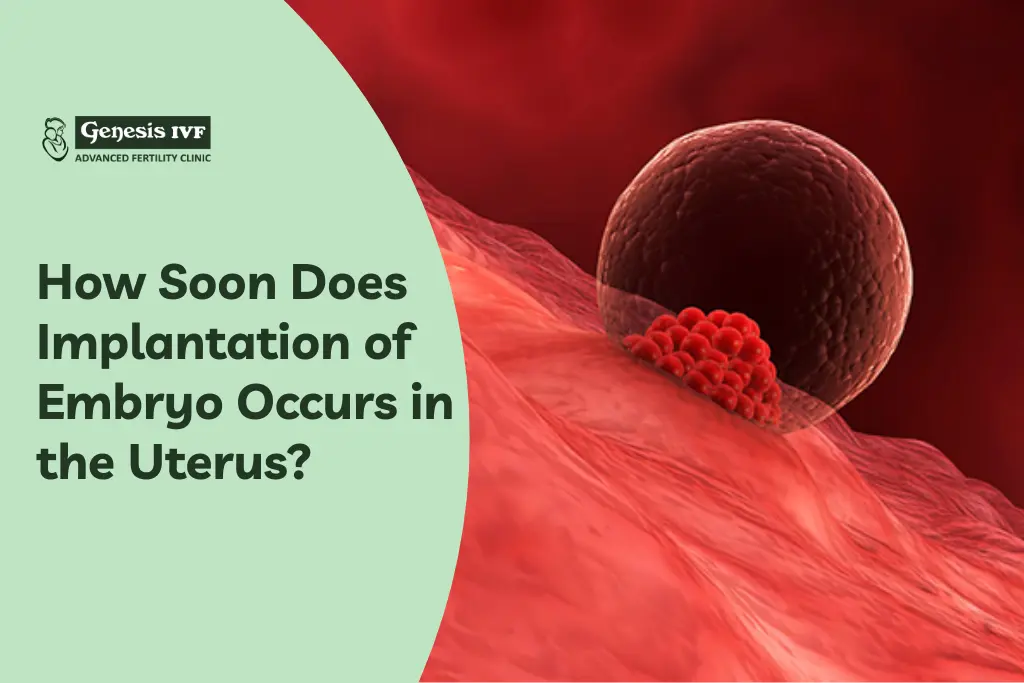For couples trying to conceive, one of the most frequently asked questions is about the timing of embryo implantation. Understanding this process can help reduce anxiety and make the journey toward parenthood more predictable. At Genesis IVF, a leading Fertility Clinic in Chennai, doctors often explain that the implantation of embryo occurs in the uterus after fertilization, but the exact timing can vary depending on several factors.
Curious about when an embryo implants? Understanding the timing can ease anxiety and help you navigate your journey to parenthood with confidence.
Understanding the Embryo Implantation Process
Embryo implantation is a critical step in the journey to pregnancy. After fertilization, the embryo travels from the fallopian tube to the uterus, where it must attach to the uterine lining to establish a successful pregnancy. This embryo implantation process is influenced by both the health of the embryo and the receptivity of the uterine lining.
When an embryo reaches the uterus, it begins to search for a suitable spot to attach. This is when the uterine lining, also known as the endometrium, plays a crucial role. A well-prepared endometrium provides the nutrients and support necessary for the embryo to grow.
When Does Implantation Occur?
Timing is a key aspect of implantation. Generally, implantation after embryo transfer or natural fertilization occurs around 6 to 10 days post-fertilization. However, it can slightly vary from woman to woman. The question of when does implantation occur depends on factors such as embryo quality, uterine health, and hormonal support.
In IVF cycles, the timing can be more predictable because doctors know the exact day the embryo is transferred. Still, couples often ask, how long does it take for an embryo to implant after transfer. Typically, it takes about 3 to 5 days after a blastocyst transfer for implantation to begin, while cleavage-stage embryos might take a slightly longer time.
Signs and Symptoms of Embryo Implantation
Many women are eager to recognize early signs of pregnancy. During natural conception or IVF, embryo implantation symptoms can appear, although they are often subtle. Some common symptoms include mild cramping, spotting, breast tenderness, and slight changes in mood.
For those undergoing IVF, monitoring for symptoms of implantation after embryo transfer can provide reassurance, but not everyone experiences noticeable signs. Blood tests and ultrasounds remain the most reliable methods for confirming implantation.
Implantation of Embryo in Uterus: IVF Perspective
In IVF treatments, understanding the implantation of embryo in uterus is particularly important. After the embryo transfer procedure, the embryo must attach to the uterine lining to establish pregnancy. This step is often supported by hormonal medications like progesterone to enhance the chances of successful implantation.
Embryo implantation IVF cycles are carefully timed to mimic natural implantation. Doctors track the embryo implantation timeline closely, which allows them to guide patients on when to take pregnancy tests and what symptoms to expect.
Factors Affecting Embryo Implantation
Several factors can influence implantation success:
- Uterine Health: A healthy endometrium is crucial. Conditions like polyps or fibroids can interfere with implantation.
- Embryo Quality: Higher-quality embryos have a higher chance of successful implantation.
- Hormonal Balance: Adequate levels of progesterone and estrogen support the endometrium and promote implantation.
- Lifestyle Factors: Stress, nutrition, and overall health can subtly affect the process.
How Much Time Embryo Takes to Implant
One of the most common concerns is how much time embryo takes to implant. After natural conception, implantation usually occurs between 6 to 10 days after ovulation. In IVF, the timing is slightly more controlled. After embryo transfer, most doctors recommend waiting at least 10 to 14 days before performing a pregnancy test to confirm implantation.
Patients often ask, after embryo transfer how many days to implant. While some embryos implant as early as 3 days post-transfer, it is generally safest to consider a 5-7 day window for implantation to occur.
Monitoring the Implantation Process
Monitoring the implantation process is essential for a successful pregnancy. Ultrasounds can detect a gestational sac as early as 4-5 weeks into pregnancy. Blood tests measuring hCG levels are also used to confirm implantation and early pregnancy progress.
Understanding the embryo implantation timeline helps manage expectations and reduces stress for couples undergoing fertility treatments. Regular follow-ups at a trusted Fertility Centre in Chennai like Genesis IVF ensure that any issues are detected early, improving the chances of a healthy pregnancy.
Conclusion
The implantation of embryo occurs in the uterus after fertilization and is a delicate, vital step toward pregnancy. While the exact timing can vary, most embryos implant between 6 to 10 days post-fertilization. Awareness of the embryo implantation process, potential implantation symptoms, and proper monitoring through IVF procedures can guide couples on their journey to parenthood.




